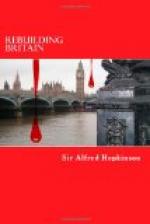What, then, can be done to reduce expenditure? It is impossible to do more than indicate in outline the machinery by which this expenditure is or might be controlled. During the War, for various reasons, the regular and ordinary checks on extravagance and waste have almost ceased to operate. The situation seems to have been getting worse until the appointment of a Special Committee of the House of Commons on National Expenditure in July, 1917. The Committee consisted of men with business knowledge, and its reports have furnished valuable suggestions. On such a subject anybody who has not direct access to documents and definite personal knowledge of the work and expenditure of various departments, and also some personal experience in State finance, may well hesitate to express an opinion, and will prefer to quote the views of those who have fuller information and better means of judging. There has been much waste; what has gone on has even been described as a “wild orgy of extravagance.” The phrase has been used not only by irresponsible critics, but by business men whose words carry weight. Let us call two witnesses out of many available.
Mr. H. Samuel, in speaking of the work of the Select Committee, as late as June 19, 1918, said, in the House of Commons, “that the Committee had formed the opinion that in some cases the staffs of Government departments had been swollen beyond all estimation; that they were frequently ill-organised; that there was much waste of labour and consequently of money in their establishments; that the Treasury had not risen to the occasion during the War, and the Committee had regretfully come to the conclusion that the War Office had been adopting a deliberately obstructive attitude.” Mr. Runciman on the same occasion stated that “lax expenditure and loose control over distribution of public money went far beyond the immediate departments concerned. It went down into every factory, and the general effect was a scale of national extravagance from which we should recover after the War only with the greatest difficulty.”
We shall not recover at all except by immediate, determined and, above all, methodical action. Small economies, as Mr. Gladstone long ago pointed out, are not to be despised. It is no doubt right to put up notices in Government offices not to put coal on the fire after three o’clock, but these savings will not go far when half a million can be thrown away on the bogs and rocks round Loch Doon with no useful result of any kind, and yet nobody seems to be made responsible for this waste, nor can anyone say why it was allowed. We hear again and again of improvident contracts and extravagant purchases, and also of absurd cost incurred in supervising minute details. Why cannot clear general authority to act on the spot in certain matters be given to some responsible person, instead of instituting a system of checks which often cause great delay as well as expense? A water pipe at a camp wants




